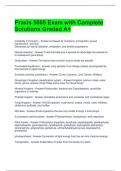Praxis 5005 Exam with Complete
Solutions Graded A+
Variability in Evolution - Answer-Increases by mutations, immigration, sexual
reproduction, and size
Decreases by natural selection, emigration, and smaller populations
Natural selection - Answer-Traits that help give a species an advantage are passed on
to subsequent generations
Gradualism - Answer-The theory that evolution occurs slowly but steadily
Punctuated Equilibrium - Answer-Long periods of no change (stasis) accompanied by
brief periods of rapid change
Evolution scientist contributors - Answer-Cuvier, Lamarck, Lyell, Darwin, Wallace
Groupings of kingdom classification system - Answer-Kingdom, phylum, class, order,
family, genus, species (King Phillip Came Over For Good Soup)
Monera Kingdom - Answer-Prokaryotes- bacteria and Cyanobacteria, unicellular
organisms or colonies
Protista kingdom - Answer-Unicellular protozoans and unicellular and multicellular algae
Fungi kingdom - Answer-100,000 species- mushrooms, yeasts, molds, rusts, mildews,
stinkhorns, puffballs, and truffles
Microbes - Answer-Small organisms that are only visible through a microscope
3 processes used by plants - Answer-Photosynthesis, transpiration, and respiration
Plant names - Answer-Chlorophyta, bryophyta, lycophata, equisetopsida, pteridophytes,
spermatopsida, gymnosperms, cycadophyta, gnetophyta, spenophyta, pterophyta,
coniferophyta, gingkophyta, psilophyta, anthophyta(largest group) angiosperms,
gnetophyta
photosynthesis - Answer-Conversion of light energy from the sun into chemical energy.
Transpiration - Answer-Evaporation of water from the leaves of a plant
, Respiration-plants - Answer-Utilization of food that was produced during photosynthesis
Seed - Answer-Consists of 3 parts: embryo, endosperm- (food for embryo) seed coat-
(protection)
Animal kingdom facts - Answer-1 million species, half are insects, multicellular,
hetertrophic, no cell walls, reproduce sexually, can move, respond to environment
Heterotrophic - Answer-Method of getting energy by eating food that has energy
releasing substances
Porifera - Answer-sponges
Cnidaria - Answer-Jellyfish, obelia, and hydrozoa
Platyhelminthes - Answer-flatworms
Nematoda - Answer-Roundworms, hookworms, parasites
Mollusca - Answer-Clams, mussels, oysters, snails and slugs, octopus squid and
chitons
Annelida - Answer-Earthworms, clamworms, leeches
Arthropoda - Answer-Crustaceans, insects, centipedes, horseshoe crab, arachnids,
Echinodermata - Answer-Have radial symmetry- Sea urchins, sand dollars, starfish, etc
Chordata - Answer-Humans and all other vertebrates, also including sharks, skates,
rays, hagfish, bony fishes, amphibians, reptiles, birds and mammals
Organ systems - Answer-Skeletal: bones/joints
Muscular: muscles
Nervous: brain, spinal cord and nerves
Digestive: mouth, pharynx, esophagus, stomach, intestines teeth tongue gallbladder
pancreas appendix and anus
Respiratory: nose pharynx trachea bronchi lungs
Circulatory: heart blood and blood vessels
Skin (integumentary)- skin hair nails sense receptors sweat glands oil glands
Excretory: kidneys, ureters, bladder, urethera
Immune: lymphatic system, nodes, thymus, spleen
Endocrine: pituitary gland, pineal gland, hypothalamus, thyroid, adrenal, pancreas,
ovaries, testes
Reproductive: male and female parts




